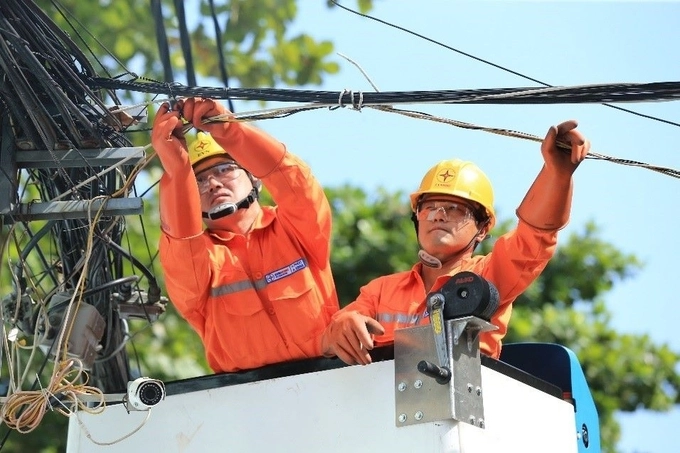According to theElectricity of Vietnam (EVN), from May 4, the average retail electricity price will increase by 3% compared to the current price, to 1,9203732 VND/kWh (~$0.082).

The need to increase electricity price
The retail price of electricity was adjusted up for the last time in March 2019, with an increase of 8.36%, hence it has been 4 years without electricity price increase, while the energy crisis is taking place globally.
As electricity is a strategic commodity under price control by the state, used in most economic sectors and for household consumption. The lack of electricity will lead to production stagnation and heavily affecting people's lives.
Currently, the proportion of coal-fired, gas-fired and oil-fired thermal power accounts for 43.5% of the total national electricity output, meaning electricity generated from fossil fuels accounts for a large proportion. Meanwhile, the price of coal used for electricity production in 2022 increased by 264% and the price of gasoline increased by 143% compared to 2021. On March 31, 2023, the Ministry of Industry and Trade announced that the electricity production and business costs of the Electricity of Vietnam (EVN) in 2022 increased by 9.27% compared to 2021. However, due to not adjusting the electricity price in 2022, EVN lost over 26.4 trillion dong (~$1,2 billion). Particularly in the first quarter of 2023, EVN is expected to continue to lose 18.4 trillion VND (~$785k).
Regarding the inspection results of EVN's electricity production and business costs, the Ministry of Industry and Trade said that in 2021, the total cost of electricity production and business was 419,031 billion VND (~$17.9 billion), and in 2022 it was 493,265 billion VND (~$21.1 billion) (including production and business costs. electricity business of the stages of generation, transmission, distribution - retail of electricity and ancillary - industry management).
If the average retail price of electricity is not adjusted in time to an appropriate level, then the total accumulated losses of 2022 and 2023 are expected to be over 68.7 trillion VND (~$2.9 billions). This loss will heavily affect the preservation of state capital at EVN, the ability to provide enough electricity for the economy, the national energy security in the context of climate change leading to El Nino phenomenon, and the increasing demand for electricity from the economy.
The impacts on the economy
The increase of electricity price affects households and businesses differently depending on their monthly consumption.

With an increase of 3%, the additional electricity bill of households consuming 50 kWh/month is 2,500 VND/household (~$0.11) (the number of households using electricity under 50 kWh in EVN in 2022 is 3.33 million households, accounting for 11.98% in the total number of households using electricity for domestic purposes).
The additional electricity bill of households consuming 100 kWh/month is 5,100 VND/household (~$0.22) (the number of households using electricity from 51-100 kWh in EVN in 2022 is 4.7 million households, accounting for 16.85% of the total number of households using electricity).
The additional electricity bill of households consuming 200 kWh/month is 11,100 VND/household (~$0.47) (the number of households using electricity from 101-200 kWh in EVN in 2022 is 10.04 million households, accounting for 36.01% of the total number of households using electricity - this is the customer group that accounts for the largest proportion).
The additional electricity bill of households consuming 300 kWh/month is 18,700 VND/household (~$0.80) (the number of households using electricity from 201-300 kWh for the whole EVN in 2022 is 4.96 million households, accounting for 17.81% of the total number of households using electricity).
The additional electricity bill of households consuming 400 kWh/month is 27,200 VND/household (~$1.16) (the number of households using electricity from 301-400 kWh throughout EVN in 2022 is 2.21 million households, accounting for 7.95% of the total number of households using electricity).
For 528,000 service customers, on average, business customers pay electricity bills of 5.3 million VND/month (~$226). After changing the price each month, you will pay an additional 141,000 VND/month ($6.01).
There are 1,822 million producing households, on average, each producing household pays 10.6 million VND/month (~$452) for electricity. After changing the monthly price, there will be an additional pay of 307,000 VND/month (~$13.9).
There are 662,000 non-business administrative customers, on average each non-business administrative customer pays an electricity bill of 2.01 million VND/month (~$85.7). After changing the monthly price, there will be an additional pay of 40,000 VND/month (~$1.71).
The suitable solutions
According to calculations, if electricity price increases by 8%, GDP will decrease by 0.36% and inflation by 0.5%, if electricity price increases by 10%, GDP will decrease by 0.45% and inflation by 0.61%. The increase in electricity prices is putting the government in a dilemma in realising the socio-economic development target in 2023 with a growth rate of 6.5%, inflation control of 4.5%.
In principle, the selling price of the product must cover all costs and ensure a profit to develop and expand production. According to EVN's calculations, in order to achieve breakeven, the retail price of electricity needs to increase by 9%, lower than the increase in electricity production and business costs of 9.27% in 2022 compared to 2021 because EVN has saved 10 % of regular costs, cutting major repair costs by 30%, saving labor costs and other costs.
In order to achieve the aim of achieving Net Zero by 2050 (COP27), energy transformation is an inevitable. However, as energy transition requires huge investment in capital and technology, it is very important for Vietnam to urgently develop a strategy and roadmap for the transition from the production and use of fossil energy to the production and use of renewable and green energy, and enhance the independence, autonomy and competitiveness of the economy.
Source: the Internet
